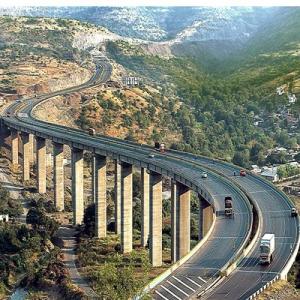With buyers playing safe, projects such as Delhi-Gurgaon Expressway find it difficult to get new concessionaires
When IDFC starts looking for buyers for the Delhi-Gurgaon Expressway, the hunt might not be that easy as scores of other road projects are already on the lookout for buyers. With a changed tolling structure for the Delhi-Gurgaon Expressway, the valuations, too, might not be as high as expected for the project.  According to experts, at least 40 road projects are up for grabs in India. Most of them have not been able to find buyers or the right valuations for their stake mostly due to the economic downturn.
According to experts, at least 40 road projects are up for grabs in India. Most of them have not been able to find buyers or the right valuations for their stake mostly due to the economic downturn.
IDFC, which had recently taken over the project from DSC Limited, now has to bring a concessionaire within the next three months to run the project.
The lenders could form a Special Purpose Vehicle (SPV) to run the Delhi-Gurgaon Expressway or bring in a new concessionaire. “But today, the market has become a buyer’s one and it is the infrastructure funds and the private equity players that are buying stake in projects. They (private equity firms) have the capacity to stay longer compared with companies,” says Vinayak Chatterjee, chairman and managing director at Feedback Infra.
Feedback Infra is currently running the Delhi-Gurgaon Expressway in the absence of a concessionaire, until IDFC finds one for the project. According to experts, aggressive bidding by companies while grabbing road projects and a reduction in toll collection over the past few years have forced many firms to start selling their stake in road projects.
Road developers had bet on high economic growth, which translates into larger number of vehicles, thereby increasing the prospects of higher toll revenue, while bidding for road projects. The road sector had seen a boom period between 2009 and 2011, when the government had awarded a large number of road projects on the public-private partnership (PPP) mode. However, over the past few years, a number of road projects have been stuck or not started construction because of the economic slowdown, rising road construction costs and a decline in projected traffic flow.
Last year, about 10 road projects — including GMR Ulundurpet Expressways, GMR Jadcherla Expressways and SEW Navyuga Tollways —could find buyers and many more were looking to sell their stake. Experts say infrastructure-focused funds and companies are actively pursuing the market for more options. Larsen & Toubro, too, has been trying to sell assets.
“We are now waiting for the elections to get over and new government to take charge. There are a large number of sellers and every company wants to sell their asset and generate some money. But we are not finding enough buyers and it is difficult to get the valuation right,” says a senior L&T executive.
Exiting helps companies free up their balance sheets and reduce debt. “Companies are not willing to take over projects since they do not want to add the baggage of debt that the project is already carrying to their balance sheet. PE funds and infra-focused funds do not have the problem of taking on that baggage after they bag projects at a cheaper price,” adds Chatterjee.
“Road projects, which have not been able to yield much revenue for companies are the ones on sale. But with the buyers looking at cheaper options, many companies have also been forced to sell in distress. Valuation of projects, therefore, remains a concern,” says Vishwas Udgirkar, senior director at Deloitte Touche Tohmatsu.
India’s road sector, which breathed a sigh of relief after the government agreed to reschedule premium payment, is also expected to take time to recover. This year, the government approved two key policies to help the distressed sector by tweaking the exit policy for companies and agreeing to reschedule the premium that companies owe the government.
The government, which is to get more than Rs 1.5 lakh crore from companies over the next 20-25 years, was forced to reschedule premiums after companies threatened to walk out of projects. Additionally, the government had also decided to scrap projects on the PPP mode this year.
While the sector is saddled with a plethora of problems largely due to the current economic slowdown, policy issues also play a major role. Significant delays in land acquisition by concession-granting authorities and problems pertaining to regulatory clearances are among the common issues across projects.
“The host of policy measures announced by the government over the past few years will resurrect waning investor confidence in the struggling roads sector. However, benefits are likely to accrue only in the long term. The issues have accentuated with the generally-stressed financial and liquidity profile of road developers,” said India Ratings & Research in a statement.










